You may have missed the tweet by @AstraZeneca yesterday that announced “Join the #depression discussion on the #TakeonDepression Facebook page http://ow.ly/3Zihl“. This tweet was posted just a few hours after my podcast of a conversation with @TonyJewell, Senior Director for External Communications at AstraZeneca and editor of AZ Health Connections blog, about the recent #rxsave Twitter chat and plans for future pharma-hosted chats (listen to the podcast “The Future of Pharma-Sponsored Twitter & Other Social Media Chats: A Review of the First Pharma-Sponsored Twitter Chat“).
I’m surprised Tony didn’t mention this Facebook depression chat during my interview. The “Take on Depression” FB page itself was launched back in October, 2010 along with an @FaceDepression Twitter account. I notice that only 2 of my FaceBook friends “Like” the Take On Depression page.
According to the press release (here) “The “Take on Depression” Facebook page will provide tools and resources to individuals who are struggling to manage their symptoms of bipolar depression and MDD [major depressive disorder]. The @FaceDepression Twitter feed will provide articles, links to Web sites, tips, and community events that will help people learn more about their illness and have a more effective dialogue with their physician.”
In the press release, Sandy Sommer, Executive Director and Commercial Brand Leader at AstraZeneca said “With the launch of these Facebook and Twitter pages, AstraZeneca hopes to amplify conversations about mental health and provide important health information in innovative ways.”
AstraZeneca includes several “rules” at the top of the FB discussion page, including “please refrain from mentioning specific pharmaceutical products by name” and “all comments will be evaluated by AstraZeneca before posting,” etc.
“Want to join the discussion? Chime in on the discussion board or start your own thread now!” says AZ. But there was only 1 topic/post for discussion entitled “Welcome.” It was made by “Take on Depression” — a non-person representing the site — back on January 4, 2011. It said: “Hey Take on Depression fans! Use the Take on Depression Facebook page to review information and connect with others who have been affected by bipolar depression or major depressive disorder. You can use this DISCUSSIONS tab to post about what you’re going through in order to help others.”
There were no responses, so I decided to post a reply asking for a definition of bipolar depression and MDD. The following notice popped up (click on image for an enlarged, readable view):
This is pretty typical stuff; ie, absolutely no mention of product names will be tolerated. There’s one small problem, however.
Seroquel Lurks Behind the Scenes
I noticed that it took a long time to display the discussion page and posts. During the minute or so the application was loading, I also noticed the following URL being accessed: http://www.seroquelfbdiscapp.com/, which contains a product brand name; ie, Seroquel!
In fact, you can type that URL in your browser and you will see the “naked” app without the surrounding FaceBook stuff, as in this screen shot (click to enlarge):
Most users would never notice the URL, but there it is. Will the FDA notice? Will it matter? It’s a small issue, but I can’t explain why AZ would need to use the trade name in the app URL when it could have just as well done without it. If AZ has changed the URL by the time you read this, Nevermind!
I’ll keep you posted about my attempt to get the discussion going.
Meanwhile, I also checked out the @FaceDepression Twitter account. That account is “locked,” which means @FaceDepression’s Tweets are protected and only confirmed followers have access to @FaceDepression’s Tweets and complete profile.” You need to send a request before you can start following this account. I sent a request.
I’m not sure why AZ would do this. “When you lock your Twitter account,” says wiki.answers.com, “only your followers can see your updates. Also, you will have to approve any new followers. It’s like as if only your friends have the option to see you, kind of like being a king, you approve and see who can do stuff, but only a few people can see you.”
Being the “King” these days is not very popular with the populace as we are witnessing in the Middle East. But I suppose pharma companies are comfortable sitting in their media throne issuing edicts for the populace to read, but only the elite, chosen members of the populace are invited into the conversation!
UPDATE: 2/20/2011. Tony Jewell emailed me soon after this post was published and said “I have directed your questions about take on depression to brand corporate affairs, which handles these subjects (I handle the corporate stuff). Let me know if nobody gets in touch.” It’s the weekend, so I haven’t heard anything yet.
Meanwhile, I notice that the URL for the discussion app was changed after I made my post to www.takeondepressionfbdiscapp.com/, which proves that I provide useful insights.
I did a little WHOIS search on these domain names to get some idea who was responsible. It turns out that Edelman PR Worldwide registered both domains (see WHOIS results in the composite screen capture below; personal information has been redacted from this image at the personal request of the person whose name was used to register the domains. As I recommended below when I first made this post, the domain registration is now private. See here.).
Edelman is an Advertising Age “Top Ranked PR Agency” with 3,600 employees in 53 offices worldwide. I did not know that this agency had an office in Brooklyn Heights, NYC, one of the many New York neighborhoods I lived in. So I used Google maps to see exactly where their Brooklyn office was located and found an unassuming townhouse on a (nice) side street (I removed the image of the building I found upon request from the person who lives at the address). I was expecting something a little more impressive!
Here are a couple of reasons why I find this interesting:
(1) AZ used a PR agency, which may have “farmed out” the Take On Depression discussion board programming to another agency; ie, [redacted], “a next-generation digital marketing firm that designs and executes integrated digital marketing programs enabling clients to achieve scale in their digital marketing.” I discovered this by finding the domains’ administrative and technical contact person on LinkedIn, who — according to his LinkedIn profile — was Edelman’s SVP of Interactive Solutions and is now CEO of [redacted].
NOTE: This person contacted me by e-mail and claimed “My credit card was used to set up all manner of accounts over those 11 years [that he was at Edelman; beginning in October 1998, ending in September 2009]. It appears that after I left in September 2009 that some of the accounts were not updated, hence the WHOIS data shows my address and name.” But the WHOIS entry was created on 18 October 2010, more than a year after this person left Edelman. Why Edelman was still using his credit card and private address a year after he left the company is a mystery. I also do not know why it was used AGAIN just a few days ago to create the new WHOIS entry for the takeondepressionfbdiscapp.com domain.
(2) Using someone’s private home address in domain registrations is NOT cool! As noted in wikipedia (here) “Currently the Internet Corporation for Assigned Names and Numbers (ICANN) broadly requires that the mailing address, phone number and e-mail address of those owning/managing a domain name to be made publicly available through the “WHOIS” directories. However, that policy enables spammers, direct marketers, identity thieves, or other attackers to loot the directory for personal information about these people.”
When registering a domain name it is possible to use a “private registration” proxy so that your personal information is not readily available in the WHOIS database. Godaddy, which was the domain registrar in this case, offers that service. But, unfortunately, the cat may be out of the bag.
P.S. If Edelman does make the above domain registrations private, then I will — if formally requested — update this post and remove personally-identifiable information (but not corporate information).
NOTE: The person whose name is being used
P.P.S. Wow! I no longer have the “creds” to view the discussion on AZ’s #TakeonDepression Facebook page. Maybe nobody does!
UPDATE (2/21/2011):
I received this email today from Stephanie Andrzejewski, AZ’s Director, Brand Corporate Affairs:
Hi John –
AstraZeneca is aware that the name of one of our products, SEROQUEL, was inadvertently included in coding in the Take on Depression Facebook page. No product name was ever included in the actual contents of the page and the Take on Depression Facebook page is not intended for the promotion of products. As soon as we became aware of the error, we immediately amended the code. AstraZeneca is fully committed to open, honest, transparent, and ethical social media practices.
Regards,
Stephanie
I responded:
Stephanie,
Thanks for getting back to me. I am impressed that this error was corrected in a timely fashion considering it is a holiday weekend!
But this error could have been averted if — as suggested by commenters to my blog — AZ had chosen a more regulatory-savvy agency to handle at least the technical aspects of its social media campaign. The problems I cited indicate that this important AZ social media initiative may not have been given the attention necessary to convince people that AZ is committed to open, honest, transparent, and ethical social media practices, IMHO.


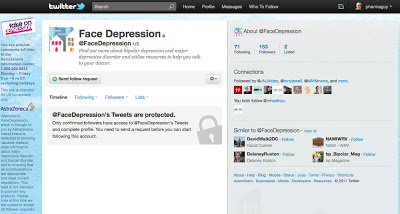
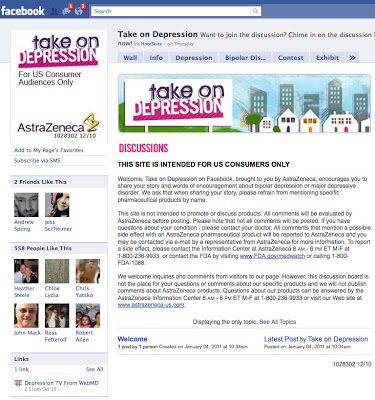
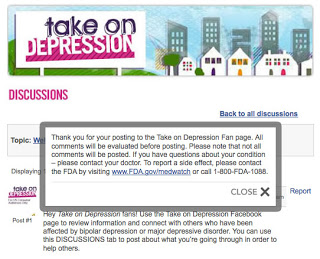
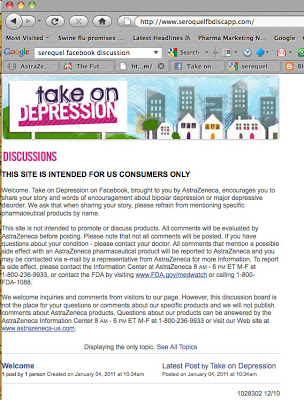
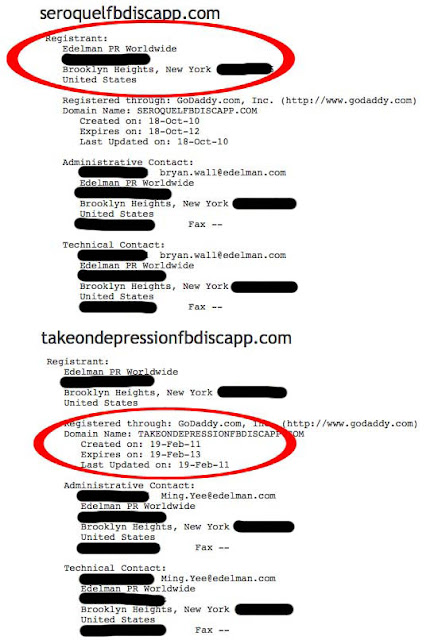







![6 Digital Tools at the Center of Healthcare Digitalization [INFOGRAPHIC]](http://ec2-54-175-84-28.compute-1.amazonaws.com/pharma-mkting.com/wp-content/uploads/2021/04/6DigitalTools_600px-100x70.jpg)




